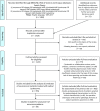Patterns and predictors of recurrence after open radical cystectomy for bladder cancer: a comprehensive review of the literature
- PMID: 29147759
- PMCID: PMC5799348
- DOI: 10.1007/s00345-017-2115-4
Patterns and predictors of recurrence after open radical cystectomy for bladder cancer: a comprehensive review of the literature
Abstract
Purpose: To review the currently available literature reporting the patterns of recurrence and their predictive factors after open radical cystectomy (RC) for bladder cancer.
Methods: A review of the literature was performed using the MEDLINE, Scopus and Web of Sciences databases from January 1997 to May 2017. The PRISMA guidelines were followed for the conduct of the study.
Results: Local recurrence rate ranges between 30 and 54%. Distant recurrence is not often standardized and is reported in up to 50% of cases. The overall 5-year recurrence-free survival rates from 58 to 81%. The mean follow-up of studies included in the analysis ranged from 18 to 350 months. Details on the most important demographic and epidemiological, clinical, histologic and pathologic predictors of recurrence after radical cystectomy are provided through an evidence-based approach. The impact of the extension of lymph node dissection on recurrence after RC is investigated.
Conclusions: A correct prognostic assessment is essential for patients undergoing radical cystectomy for bladder cancer, thereby potentially improving their oncologic outcomes.
Keywords: Adjuvant chemotherapy; Bladder cancer; Lymph node dissection; Neoadjuvant chemotherapy; Radical cystectomy; Recurrence.
Conflict of interest statement
Conflict of interest
The authors declare that they have no conflict of interest.
Human participants and/or animals
The present research does not involve any human participants or animals.
Informed consent
Informed consent was not obtained, as no individual has been included in the study.
Figures
References
-
- Alfred Witjes J, Lebret T, Comperat EM, et al. Updated 2016 EAU guidelines on muscle-invasive and metastatic bladder cancer. Eur Urol. 2016 - PubMed
Publication types
MeSH terms
Substances
LinkOut - more resources
Full Text Sources
Other Literature Sources
Medical


